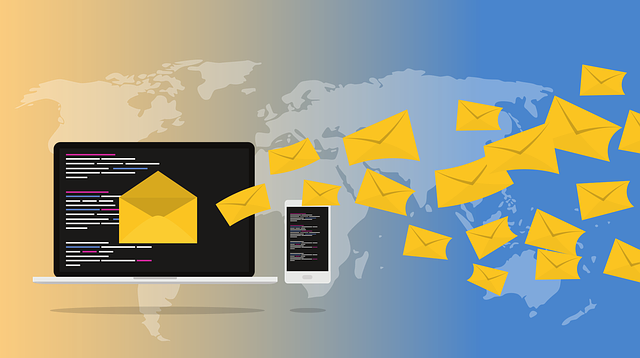Email marketing software is a powerful tool in today's digital landscape, revolutionizing business communication and driving conversion rates. By automating targeted campaigns, segmenting customers, and personalizing content based on data, companies can enhance engagement and sales. Integration with CRM systems and social media automation further optimizes the customer journey, providing a comprehensive strategy for e-commerce success. Conversion Rate Optimization (CRO) techniques and data analysis are crucial for measuring success and improving campaign performance.
Email marketing software has become a pivotal tool for businesses, significantly impacting conversion rates. This article delves into the various aspects of how such software influences customer engagement and sales. We explore key strategies like personalization, which boosts interest, and automated campaigns, offering efficiency vs. human interaction trade-offs. Additionally, we discuss data-driven insights and conversion rate optimization techniques, all centered around enhancing email marketing effectiveness using specific software tools.
- Understanding Email Marketing Software's Role in Conversions
- Personalization: Enhancing Engagement and Buyer Interest
- Automated Campaigns: Efficiency vs. Human Touch
- Data-Driven Insights for Targeted Strategies
- Measuring Success: Conversion Rate Optimization Techniques
Understanding Email Marketing Software's Role in Conversions

Email marketing software plays a pivotal role in enhancing conversion rates for businesses, especially in today’s digital landscape. It acts as a powerful tool to engage and convert potential customers by providing targeted and personalized communication. Through automated email campaigns, companies can effectively build relationships with clients, promoting product awareness and driving sales.
The software enables businesses to segment their customer base, allowing them to tailor messages according to specific demographics, behaviors, or preferences. This level of customization significantly increases the chances of capturing a recipient’s attention and encouraging desired actions, whether it’s making a purchase, signing up for a service, or downloading an app. Moreover, integrating email marketing with other digital channels like text message marketing or sales funnels can create a seamless customer journey, further optimizing conversion opportunities for e-commerce solutions.
Personalization: Enhancing Engagement and Buyer Interest

Personalization is a powerful tool offered by email marketing software that significantly enhances engagement and sparks buyer interest. By tailoring messages to individual subscribers based on their purchase history, browsing behavior, or even personal preferences, businesses can create a sense of relevance and connection. This level of customization goes beyond generic greetings; it involves segmenting your audience into distinct groups and crafting content specifically for each. For instance, recommending a product to a customer who recently viewed similar items increases the likelihood of conversion.
Marketing automation, powered by these software solutions, allows for dynamic content creation and personalized subject lines, ensuring that each recipient feels understood. Moreover, marketing analytics provided by such tools enable marketers to gauge the effectiveness of personalized campaigns, further refining their strategies. This data-driven approach not only improves customer experience but also drives higher conversion rates as businesses learn what resonates best with their target audience.
Automated Campaigns: Efficiency vs. Human Touch

The advent of email marketing software has dramatically transformed how businesses connect with their audiences. One notable evolution is automated campaign functionality, which allows for efficient, personalized messaging at scale. This technology enables companies to segment customers based on various behaviors and preferences, delivering targeted content that resonates with each recipient. Automated campaigns can significantly boost open rates and click-throughs, ultimately driving conversions.
However, the human touch remains an irreplaceable element in effective email marketing. While automation excels at efficiency, it sometimes lacks the emotional connection and nuanced understanding of individual customer needs that a human agent provides. Integrating automated systems with a robust customer relationship management (CRM) strategy, complemented by methods like missed call text back or WhatsApp marketing, can strike a balance between technology’s speed and personalization. This hybrid approach leverages both automation’s power and human intuition to create compelling, conversion-focused email campaigns.
Data-Driven Insights for Targeted Strategies

Email marketing software has revolutionized how businesses connect with their customers, offering data-driven insights that enable targeted strategies. By leveraging analytics provided by these tools, companies can gain a deeper understanding of customer behavior, preferences, and pain points. This wealth of information allows for highly personalized campaigns, where messages are tailored to specific segments, increasing the likelihood of engagement and conversions.
Moreover, integrating email marketing software with CRM (customer relationship management) systems and social media marketing automation platforms further enhances its effectiveness as an ecommerce solution. Seamless data flow across these channels enables businesses to create a 360-degree view of their customers, allowing for even more precise targeting and improved campaign performance, ultimately driving up conversion rates.
Measuring Success: Conversion Rate Optimization Techniques

Measuring success is a crucial aspect of email marketing software, as it directly impacts conversion rates. Businesses should employ Conversion Rate Optimization (CRO) techniques to understand how effective their campaigns are. This involves tracking key performance indicators (KPIs), such as open rates, click-through rates (CTRs), and, most importantly, conversion metrics. By analyzing these data points, marketers can identify trends, pinpoint areas for improvement, and make data-driven decisions to enhance overall performance.
One powerful tool in their arsenal is marketing automation, which includes features like A/B testing and personalized content delivery. Additionally, integrating AI chatbots into email campaigns can improve customer engagement and support, further driving conversions. Efficient reputation management through online reviews and social media interactions also plays a significant role in building trust and encouraging potential customers to make a purchase decision.
Email marketing software plays a pivotal role in enhancing conversion rates by streamlining processes and providing valuable data insights. Through personalization, automation, and data-driven strategies, businesses can significantly improve customer engagement and drive sales. By leveraging these tools effectively, companies can navigate the digital landscape, optimize their campaigns, and ultimately achieve better results.
